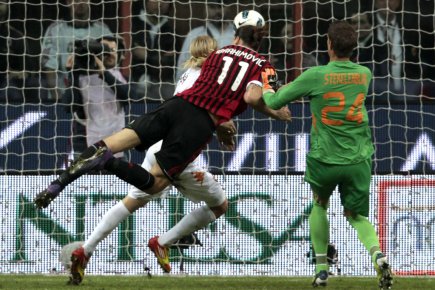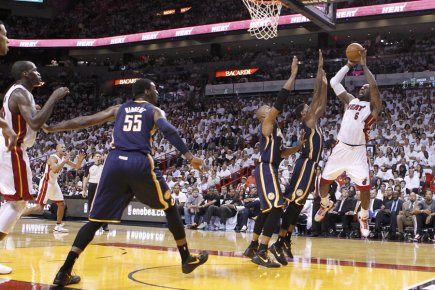Widgetized Section
Go to Admin » Appearance » Widgets » and move Gabfire Widget: Social into that MastheadOverlay zone
The Olympics: History of the Fusion Between Politics and Sports
Partager/Share this
by James Morissette
As long as there have been nations there has been political intervention in national and international athletics.
Since the violent but prestigious wrestling, boxing and stick fighting days between dominant social classes of Mesopotamia, human history has produced many examples of cross political-athletic pollination.
One of the first cases involved Ancient Greece. Greece is notorious for blending politics with sports. During Olympic Games, Greek leaders discussed important political issues, celebrated military victories and formed political and military alliances.
Then there was Ancient Rome. Gladiator games aside, Olympic victors were crowned with olive wreaths and fed the rest of their lives by their poleis. Olympians were deemed heroes, and several went on to very prestigious political and military careers.
One of the first cases involved Ancient Greece. Greece is notorious for blending politics with sports. During Olympic Games, Greek leaders discussed important political issues, celebrated military victories and formed political and military alliances.
Then there was Ancient Rome. Gladiator games aside, Olympic victors were crowned with olive wreaths and fed the rest of their lives by their poleis. Olympians were deemed heroes, and several went on to very prestigious political and military careers.
During medieval times, aristocratic knights hosted events to entertain political leaders and general audiences. One of these events was called « the tournament. » During these « tournaments, » two armored, steed-straddling knights blazed towards each other going full throttle with lances pointed straight at each other.
Many men died during these events, much to the amusement of the king, his queen and the general public. This was not to say the best jousters did not receive several political and economic perks.
Modern history is also littered with evidence pointing to the infeasible separation of sport and state.
In this slideshow I will highlight seven modern occurrences when Olympic sports fused with politics. I will also highlight a few non-Olympic situations that have also occurred in modern times to provide a broader perspective.
1-Berlin Olympics (1936)
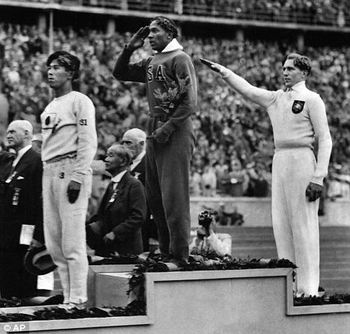
Associated Press 1936
Prior to the 1936 Berlin Olympics, German Fuhrer Adolph Hitler and company embarked on a politically motivated « German Master Race » propaganda campaign.
The purpose of this campaign was to inspire his country to Olympic prowess en route to ensuring world domination.
At the end of the Olympic Games, Hitler walked away humbled when American Olympian Jesse Owens earned four gold medals as well as a few world records.
Less than a decade later, allied forces helped Hitler walk away from Earth.
2-Tlatelolco Massacre (1968)
Thirrty-two years later, thousands of Mexican students clamored for democratic reforms outside a Mexican military occupied school in Tlatelolco.
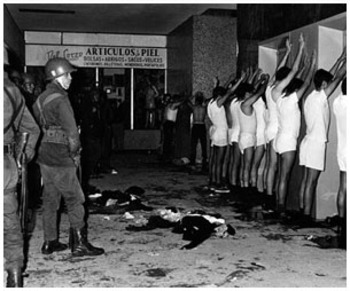
Photo Courtesy of PBS.
This occurred just ten days before the beginning of the Mexico City Olympics.
Mexico’s President the time, Gustavo Diaz Ordaz, ordered his military to suppress protesters to avoid bad PR before the Olympics.
However, Ordaz failed to meet his objectives, and in the end the Mexican Army opened fire upon and killed more than 250 protesters (though historians argue the numbers killed).
The very bad PR he tried to crush came back to crush Ordaz in what has been dubbed « The Tlatelolco Massacre. »
3- Smith and Carlos (1968)
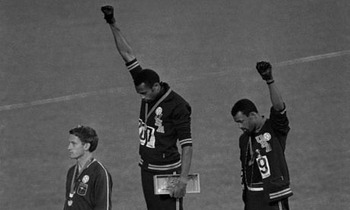
Associated Press (1968)
During the same Olympics, two African American track stars named Tommy Smith and John Carlos climbed the victory podium at Olympic Stadium.
The two men did this not just to accept medals for finishing first and third in the 200 meters, but also to demonstrate their disapproval of discrimination of African Americans in the U.S. and abroad.
With the American national anthem playing loudly in the background, these shoeless, black socked men bowed their heads and raised their black-gloved fists to the sky as a symbol of African American power.
Though this bold demonstration of « black power » by Smith and Carlos infuriated most of white America, it helped to inspire the disenfranchised to take a stand against racism and inequality.
4–Black September (1972)
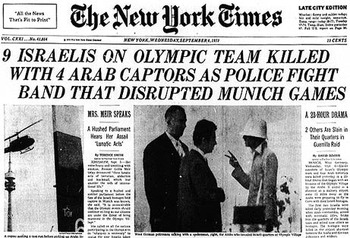
In Munich in 1972, eight members of a Palestinian terror group called « Black September » slipped into an Olympic village just outside the Olympic city and took 11 Israeli athletes and coaches hostage.
Nearly 22 hours later, 11 Israeli athletes and five terrorists were dead after an attempted rescue mission failed miserably.
This slaughter is considered one of the worst Olympic tragedies in world history.
5-The Boycott (1980)
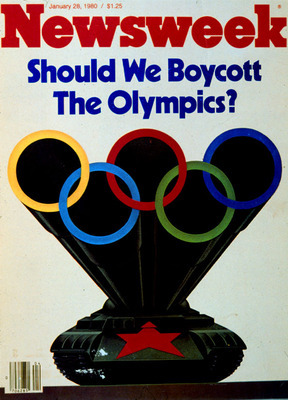
During the summer of 1980, the United States and 60 other nations boycotted the Olympics hosted by Soviet Union out of protest against the Soviet Union’s invasion of Afghanistan.
This Cold War boycott was the largest in Olympic history.
The Soviet Union returned the favor four years later by ordering its athletes to stay home during the 1984 Olympics in Los Angeles.
6-Lake Placid (1980)
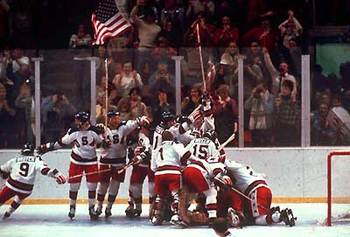
That same year at Lake Placid, New York, the U.S. hockey team flexed its mighty, freedom loving muscles before the communist loving Soviet skaters before going on to defeat them 4-3 in the semifinal.
For many Americans living during the Cold War, this hockey game is the most memorable memory in the history of the Olympic Games.
7-Los Angeles (1984)
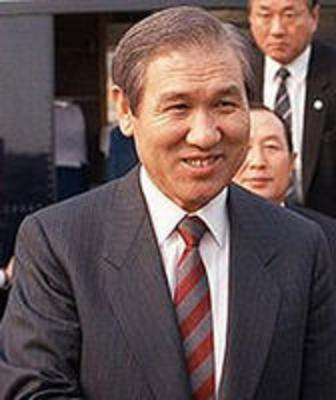
Later that year, South Korean President Roh Tae Woo personally felt the political power imposed on him by the Olympic world when the international media pressured him to surrender to democratic reform demands brought on by its citizens.
Five months before Woo opened the Seoul Olympic Games, he allowed this once military operated nation to hold free elections.
Non-Olympic Examples

Other sports/state mergers gone awry revolve around: the 1968 Detroit Tigers during the Motor City’s infamous race riots, Pakistani and Indian cricket, Pele and Brazilian soccer, African nations boycotting Montreal Olympics, the O.J. Simpson trial and Lance Armstrong’s battles with the French government over alleged use of banned substances.
Most recently we have seen sports blend with politics when Marlins manager Ozzie Guillen made pro-Fidel Castro comments. His comments enraged many Cubans living in Florida who despise the Cuban dictator.
So as you can see sports and politics have always been part of our human fabric. As sad as it is, it will always continue to be so.
So as you can see sports and politics have always been part of our human fabric. As sad as it is, it will always continue to be so.
James Morisette
Partager/Share this

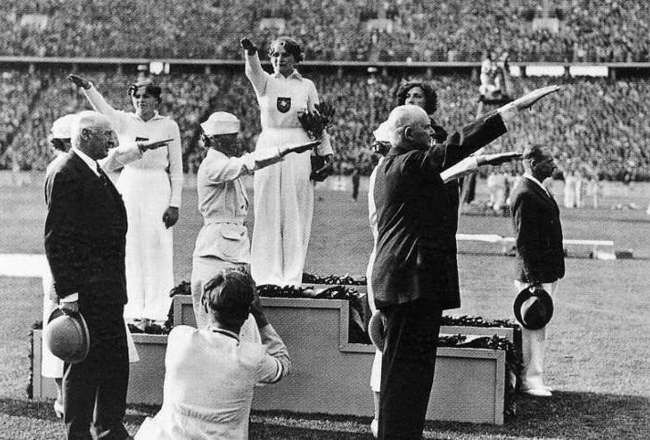
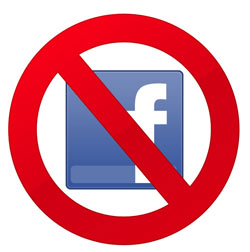



![First Images Of Tragic Vicitms Lost At Connecticut School Shooting [Photos] First Images Of Tragic Vicitms Lost At Connecticut School Shooting [Photos]](https://haitiinfos.net/wp-content/uploads/2015/02/20362455_SS.jpg)












